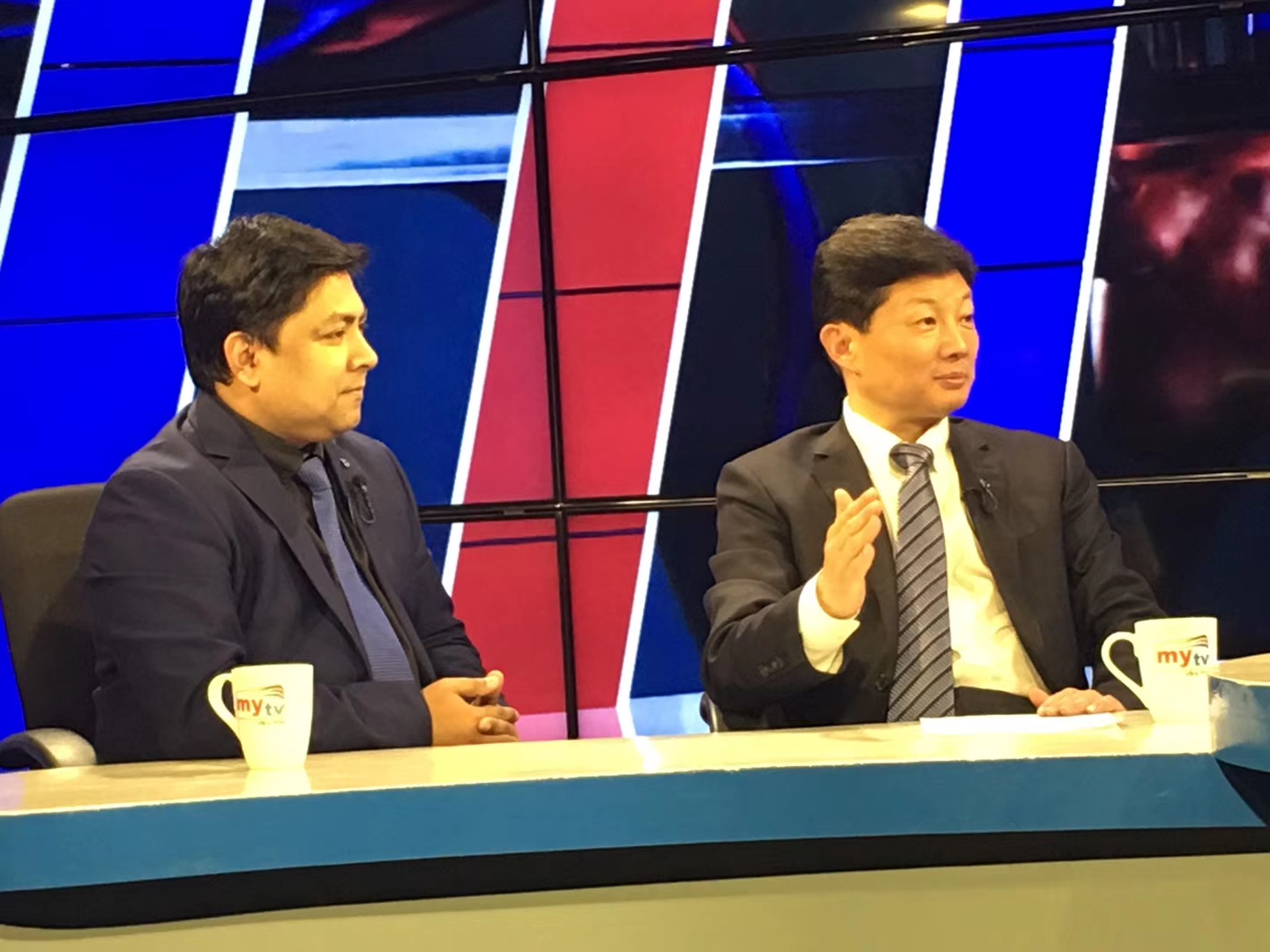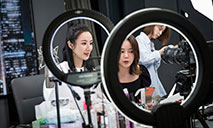Bangladeshi doctor in China: BRI builds a bridge connecting people’s hearts
As an ancient Chinese saying goes, only if a doctor is humane, compassionate, intelligent, reasonable, honest, and kind-hearted can you trust and rely on him or her. These virtues radiate from Dr. Misbahul Ferdous, a Bangladeshi cardiologist working at the Department of Cardiology at Fuwai Hospital in Beijing, China.
Coming to China for further study in the field of medicine in September 2009, Ferdous completed his master’s degree and was the first Ph.D. student in medicine from Bangladesh to graduate from Shandong University. Recalling how he made the decision to come to China, he said it was the best choice he has ever made in his life so far.
“After I finished my bachelor’s degree [in Bangladesh], one of my teachers told me, Ovik [Ferdous' English name], you must go to China for your postgraduate degree," said Ferdous. Yearning to access China’s advanced medical technology and equipment, Ferdous was determined to chase his medical studies and career path in China.

Dr. Misbahul Ferdous, the first Ph.D. student from Bangladesh to graduate from Shandong University in the field of medicine. (Photo provided by the interviewee)
“China is the land of opportunities for young talents. China values talents more than any other country in the world. And what attracted me most about China is that it is also the safest country in the world. I feel that my family and kids here are safe and secure,” he said.
During his time at Shandong University, Ferdous got the chance to work as a research fellow at an affiliated hospital of the University of Alabama in Birmingham in the United States for five months during 2011. In the same year, he went to Indraprastha Apollo Hospital in India for 5 months of training in percutaneous coronary intervention. Those experiences changed his life, broadened his view of medicine, especially in the areas of interventional cardiology and echocardiography, and brought lifelong friends and mentors to him. Ferdous was grateful to all the cardiology pioneers he met during that time.
“BRI opens the door for everyone”
After graduation and a period of fellowship in other countries, Ferdous finally got an opportunity in 2018 to work at Fuwai Hospital, an institute belonging to the Chinese Academy of Medical Sciences, which is also the National Center for Cardiovascular Diseases and the world's biggest cardiovascular center.

Prof. Wu Yongjian (R) and Dr. Misbahul Ferdous disscuss BRI-related health issues during a Bangladeshi media program. (Photo provided by the interviewee)
Since working there, Ferdous was deeply affected and inspired by two doctors, Professor Wu Yongjian, associate director of the Coronary Heart Disease Center at Fuwai Hospital, and Dr. Zhao Jie, an associate professor at the hospital. Professor Wu founded the Belt and Road CTO (Chronic Total Occlusion) project in 2016, aiming to provide medical exchange opportunities in cardiology between Fuwai Hospital and doctors worldwide. “Both of them are the dream makers for the Belt and Road cardiac project,” said Ferdous.

Prof. Wu Yongjian (second from the right) and Dr. Misbahul Ferdous (R) speak with the Education Minister of Bangladesh, Dr. Dipu Moni (L), at the C3 Cadiology Conference in Dhaka, Bangladesh. (Photo provided by the interviewee)
Thanks to that project, Ferdous is now deeply involved in the health sector in China as proposed in the Belt and Road Initiative (BRI). He is proud to be one of the coordinators of the project and passionate about promoting the platform to other Belt and Road countries.
“In most people’s mind, the Belt and Road initiative only means bridges, roads, infrastructure, finance, etc. They never thought that the BRI could be a driving force in the health sector,” he said.
“So in 2018, we started promoting the CTO project to many other BRI countries. Once we ‘opened the door’, we received overwhelming responses from cardiologists all over the world. Cardiology leaders from more than ten countries visited Fuwai Hospital for medical exchanges during the Belt and Road CTO week in 2018. In 2019, our team also traveled to more than six countries to conduct heart operations. Now, Fuwai Hospital has strong collaboration with over 20 countries’ cardiology experts. More countries want to join us and send their best cardiologists to learn the advanced technologies from China.”
“Meanwhile, we created an easily-available data exchange platform and WeChat teams with these countries. When doctors are confronted with any difficulties, they can directly send their questions to us. We will then share our answers in a timely manner.”
The team also launched a mobile app called Hridoy BRI, adopting the name of the BRI. With this app, people can easily search for 24-hour service cardiac hospitals for an emergency heart operation.
As the COVID-19 pandemic continues to ravage the world, health cooperation is becoming increasingly important. Ferdous believes that the CTO project cultivated a range of cardiology team leaders for BRI countries and shared the latest technologies, experiences, and techniques with them. Looking to the future, Ferdous aspires to improve heart disease treatment in developing countries, especially Bangladesh, Nepal, Malaysia, Indonesia, Thailand, etc. He even has a vision that through this project, every BRI country can build a Belt and Road hospital specializing in cardiovascular diseases.
“Every country can engage with the Belt and Road Initiative. I hope they get the same treatment as we are getting in China. So we appreciate President Xi Jinping and the Chinese government, since the BRI opens the door for everyone. It shows the most humane kindness for mankind,” he said.
Fighting against the pandemic: Heart to heart, hand in hand
When the COVID-19 pandemic hit China in early 2020, Ferdous and Professor Wu Yongjian were in Saudi Arabia for a medical conference. Receiving countless text messages from his relatives and friends telling him to go back to his hometown in Bangladesh, as a doctor, Ferdous chose to return to China.
“China gives me so many things, like education, status, friends, and so on. Once China has trouble, I should jump at the chance of taking care of the people. If I didn't go back to China, maybe I would feel ashamed for the rest of my life. In front of the mirror, I couldn’t see myself as a doctor,” he said.
“I went to many pharmacies in Saudi Arabia to buy masks since each pharmacy only had one or two boxes of masks left, but I want to get as many as possible. I hired a taxi for half a day and visited 30 pharmacies,” Ferdous recalled.
Ferdous went back to China on January 28, 2020. He distributed all the masks he bought to his friends, colleagues, and teachers. At that time, Ferdous had become the vice president of the Asian Society of Cardiology. He sent letters to his friends and cardiologists in the BRI countries asking for help.

Dr. Misbahul Ferdous (R) receives medical supplies from Bangladesh during the pandemic. (Photo provided by the interviewee)
“On a single day in March, I received more than 60,000 masks from several different countries, especially Bangladesh, Indonesia, Nepal, and Saudi Arabia. I want to memorize that day,” Ferdous said. He sent the masks to support medical workers fighting on the frontline.
During its anti-pandemic efforts, China also helped other countries get through hard times in return. According to China’s Ministry of Commerce, the country sent its first batch of coronavirus test kits to Pakistan on January 30, 2020. Since then, China has sent medical supplies to more than 150 countries and 13 international organizations, in addition to financial aid.
As of July 9, 2021, China has provided more than 100 countries and international organizations with 500 million doses of COVID-19 vaccines and concentrates, accounting for one-sixth of current overall global COVID-19 vaccine production.

Dr. Misbahul Ferdous prepares donated masks to be sent from China to Bangladesh. (Photo provided by the interviewee)
Just like China, which had received supply donations from other countries during the early period of the pandemic, giving back to help other countries get through hard times in return, Ferdous and his team also made their own contribution. They distributed masks, personal protective equipment, and other supplies sent from China to other countries. As he said at the time, “Stand united with the doctors, in the name of the BRI.” Last year, Ferdous received the "Belt and Road Friendship Award” jointly issued by the Chinese Cardiovascular Association and other organizations, awarded for extending his support to China and other countries during the most pressing phase in the global pandemic.

Dr. Misbahul Ferdous receives the "Belt and Road Friendship Award” jointly issued by the Chinese Cardiovascular Association and other organizations. (Photo provided by the interviewee)
“Nowadays, not only me, but many people don't believe the Western media’s propaganda against China. What I feel as a doctor and what I see through my eyes is that China made the biggest contribution to defeating the pandemic. The way China brought the COVID-19 under control has helped other nations to protect their own people’s lives,” said Ferdous.
“China was the first and only single country to provide free COVID-19 treatments for their citizens. China was also the first country to share its guidelines for the treatment of COVID-19.”
“China has never set up barriers to the world. I think China has already proved that it can be the health leader for the future of the world.”
Photos
Related Stories
- BRI projects bridge China-Europe cooperation amid COVID-19 pandemic
- China delivers 350 million doses vaccines to BRI partners
- Smearing China over COVID-19 is geopolitical game: senior Bangladeshi journalist
- BRI responds to Latin America's economic needs: scholar
- Success stories of the Belt and Road Initiative in the Pacific Islands
- China's Shandong sees foreign trade with Belt and Road countries rise in H1
- Land-sea trade corridor connects 106 countries, regions
- Algeria to boost cooperation with China under BRI framework: president
- Bangladesh receives new batches of China's Sinopharm COVID-19 vaccine
- China's contributions help enable global equitable access to COVID-19 vaccines: Bangladeshi official
Copyright © 2021 People's Daily Online. All Rights Reserved.










